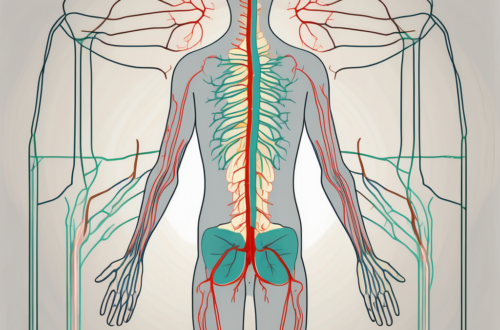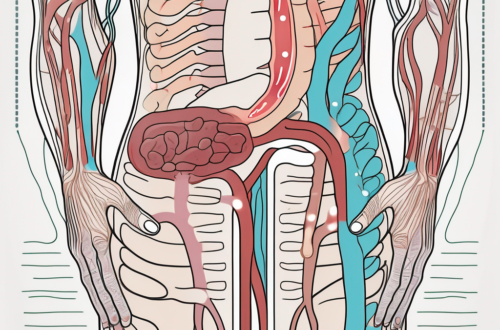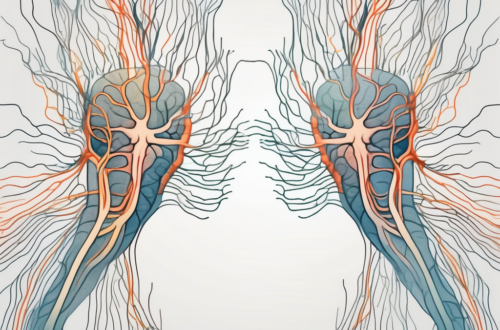The parasympathetic nervous system plays a crucial role in regulating various bodily functions, including heart function. Understanding the intricate relationship between the parasympathetic nerve and the heart is essential for comprehending the impact it has on overall cardiovascular health. In this article, we will delve into the fundamental aspects of the parasympathetic nervous system, its key components, and its influence on heart rate and heart regulation. We will also explore the connection between the parasympathetic nerve and heart disease, highlighting the importance of maintaining heart health through the proper functioning of this vital nerve. Lastly, we will touch upon future research directions that hold promise for potential therapeutic approaches targeting the parasympathetic nerve and contribute to advancing our knowledge in this domain.
Understanding the Parasympathetic Nervous System
Before delving into the intricacies of the parasympathetic nerve’s impact on heart function, it is essential to have a solid grasp of the parasympathetic nervous system itself. The parasympathetic nervous system is one of the two primary divisions of the autonomic nervous system, responsible for controlling involuntary bodily functions. It works in conjunction with the sympathetic nervous system, creating a delicate balance necessary for optimal functioning of the body.
The parasympathetic nervous system, often referred to as the “rest and digest” system, is responsible for promoting relaxation and maintaining homeostasis. It counteracts the effects of the sympathetic nervous system, which is responsible for the body’s “fight-or-flight” response. While the sympathetic nervous system stimulates the body during times of stress or excitement, the parasympathetic nervous system helps to restore calmness and balance, ensuring a state of equilibrium.
The Role of the Parasympathetic Nervous System in the Body
The primary role of the parasympathetic nervous system is to promote relaxation, rest, and digestion. It achieves this by slowing down heart rate, increasing digestive activity, and stimulating the release of saliva and digestive enzymes. When the body is in a state of rest, the parasympathetic nervous system takes over, allowing for essential processes such as digestion, elimination, and repair to occur efficiently.
Furthermore, the parasympathetic nervous system plays a crucial role in maintaining overall health and well-being. It helps to conserve energy, repair tissues, and support the immune system. By activating the parasympathetic response, the body can focus on healing, growth, and regeneration, ensuring optimal functioning and longevity.
Key Components of the Parasympathetic Nervous System
The parasympathetic nervous system consists of two main components: the cranial nerves and the sacral nerves. The cranial nerves arise from the brainstem, specifically the medulla oblongata and the pons, while the sacral nerves originate from the sacral region of the spinal cord. These nerves innervate various organs, including the heart, lungs, stomach, and intestines, and regulate their functions.
Within the parasympathetic pathway, the cranial nerves play a pivotal role in supplying parasympathetic fibers to the heart. The vagus nerve, in particular, contributes significantly to the regulation of heart rate and heart rhythm. It acts as a powerful modulator, slowing down the heart rate during periods of rest and promoting efficient cardiac function. The vagus nerve also influences other vital functions, such as digestion, breathing, and speech.
On the other hand, the sacral nerves are responsible for innervating the pelvic organs, including the bladder, reproductive organs, and lower gastrointestinal tract. They play a crucial role in controlling urination, sexual function, and bowel movements. Dysfunction of the sacral nerves can lead to various conditions, such as urinary incontinence, erectile dysfunction, and constipation.
In summary, the parasympathetic nervous system is a vital component of the autonomic nervous system, working in harmony with the sympathetic nervous system to maintain balance and regulate involuntary bodily functions. Understanding its role and components is essential in comprehending the intricate relationship between the parasympathetic nervous system and heart function.
The Parasympathetic Nerve and Heart Function
The parasympathetic nerve exerts a profound influence on heart function through its effect on heart rate and heart regulation. It does so primarily by modulating the activity of the sinoatrial (SA) node, often referred to as the “natural pacemaker” of the heart.
The SA node, located in the upper part of the right atrium, is responsible for initiating the electrical impulses that coordinate the contraction of the heart muscle. These impulses travel through specialized pathways, ensuring that the heart beats in a coordinated and efficient manner.
When the parasympathetic nerve is stimulated, it releases a neurotransmitter called acetylcholine. Acetylcholine acts on the SA node, binding to specific receptors and activating a series of intracellular signaling pathways. This ultimately leads to a decrease in the rate at which the SA node generates electrical impulses, resulting in a slower heart rate.
How the Parasympathetic Nerve Influences Heart Rate
The parasympathetic nerve has an inhibitory effect on heart rate through the release of acetylcholine. When the parasympathetic nerve is stimulated, acetylcholine is released and acts on the SA node, slowing down the electrical impulses that initiate each heartbeat. This ultimately leads to a decrease in heart rate, allowing for a more relaxed state and conservation of energy.
It is important to note that the parasympathetic nerve does not solely control heart rate. The sympathetic nervous system, which is responsible for the “fight or flight” response, also plays a role in regulating heart rate. While the parasympathetic nerve slows down heart rate, the sympathetic nerve can increase it, allowing the heart to respond to situations that require increased blood flow, such as exercise or stress.
The Parasympathetic Nerve’s Role in Heart Regulation
In addition to its impact on heart rate, the parasympathetic nerve also plays a crucial role in heart regulation. It helps to maintain a balance between sympathetic and parasympathetic influences on the heart. This balance is essential for ensuring that the heart responds appropriately to the body’s demands, such as exercise or stressful situations.
By modulating the activity of the SA node, the parasympathetic nerve, along with the sympathetic nervous system, coordinates heart rate and rhythm adjustments based on the body’s needs. This dynamic interplay allows for optimal cardiovascular function and adaptation to changing conditions.
Furthermore, the parasympathetic nerve is not the only factor influencing heart regulation. Hormones, such as adrenaline, can also have an impact on heart function. Adrenaline, released during times of stress or excitement, can increase heart rate and contractility, preparing the body for action.
Overall, the parasympathetic nerve plays a vital role in heart function and regulation. Its inhibitory effect on heart rate helps maintain a balance with the sympathetic nervous system, ensuring that the heart responds appropriately to the body’s needs. This intricate interplay between the parasympathetic and sympathetic nervous systems allows for the efficient functioning of the cardiovascular system, supporting overall health and well-being.
The Relationship Between the Parasympathetic Nerve and Heart Health
The connection between the parasympathetic nerve and heart health extends beyond the intricate control of heart rate and rhythm. It also involves the impact of this nerve on heart disease and the importance of maintaining heart health through its proper functioning.
The Parasympathetic Nerve and Heart Disease
Research has demonstrated that alterations in parasympathetic nerve activity can contribute to the development and progression of various cardiovascular diseases. For instance, reduced parasympathetic tone has been associated with an increased risk of arrhythmias, including atrial fibrillation, a common heart rhythm disorder.
Furthermore, dysfunction in the parasympathetic nerve has been implicated in heart failure, where the heart’s pumping ability is compromised. This dysfunction can lead to symptoms such as shortness of breath, fatigue, and fluid retention. Understanding the underlying mechanisms and potential therapeutic interventions targeting the parasympathetic nerve could hold promise for managing and preventing heart disease.
One potential mechanism by which the parasympathetic nerve affects heart disease is through its influence on the autonomic nervous system. The autonomic nervous system regulates involuntary bodily functions, including heart rate, blood pressure, and digestion. Disruptions in the balance between the parasympathetic and sympathetic branches of the autonomic nervous system can contribute to the development of cardiovascular disorders.
Emerging research suggests that the parasympathetic nerve may also play a role in the development of atherosclerosis, a condition characterized by the buildup of plaque in the arteries. The parasympathetic nerve’s anti-inflammatory effects may help protect against the formation of plaque and reduce the risk of heart attacks and strokes.
Maintaining Heart Health: The Role of the Parasympathetic Nerve
Given the significant influence of the parasympathetic nerve on heart health, it becomes crucial to foster its proper functioning. While certain factors, such as genetics, may influence parasympathetic activity, adopting a heart-healthy lifestyle can enhance its efficacy.
One key aspect of maintaining heart health is through proper nutrition. Eating a balanced diet rich in fruits, vegetables, whole grains, and lean proteins can contribute to overall cardiovascular health. These foods provide essential nutrients, antioxidants, and fiber that support heart function and reduce the risk of heart disease. Consult with a healthcare professional or a registered dietitian for personalized dietary recommendations.
In addition to a healthy diet, incorporating regular physical activity into your routine can help strengthen the parasympathetic nerve’s control over heart function. Exercise promotes cardiovascular fitness, improves blood flow, and enhances the heart’s ability to respond to stress. It is important to engage in exercise appropriate for your fitness level. Seek guidance from a qualified fitness professional or consult with your healthcare provider to develop an exercise plan tailored to your needs.
Maintaining a healthy body weight and managing other modifiable risk factors, such as high blood pressure, high cholesterol, and diabetes, can positively impact heart health and the functioning of the parasympathetic nerve. These risk factors are often interconnected, and addressing them can have a synergistic effect on overall cardiovascular health. Consult with your healthcare provider for personalized strategies and recommendations to manage these risk factors effectively.
It is important to note that while lifestyle modifications can contribute to maintaining heart health, individual guidance and tailored treatment plans should be sought from qualified healthcare professionals. They can provide a comprehensive evaluation and recommendations based on an individual’s unique circumstances.
Future Research Directions in Parasympathetic Nerve and Heart Function
The complex interplay between the parasympathetic nerve and heart function continues to intrigue researchers, encompassing avenues for future exploration. As our understanding of the underlying mechanisms deepens, potential therapeutic approaches targeting the parasympathetic nerve may emerge.
One area of interest in future research is the role of parasympathetic nerve activity in cardiovascular diseases. Studies have shown that dysregulation of the parasympathetic nerve can contribute to conditions such as hypertension, arrhythmias, and heart failure. By further investigating the specific mechanisms involved, researchers hope to develop targeted therapies that can restore balance to the parasympathetic nerve and improve heart health.
Potential Therapeutic Approaches Targeting the Parasympathetic Nerve
Studies are underway to investigate various interventions that may enhance parasympathetic activity and promote heart health. These interventions can range from pharmaceutical approaches to neuromodulation techniques, such as vagus nerve stimulation.
Pharmaceutical approaches involve the development of drugs that specifically target the parasympathetic nerve receptors, enhancing its activity and promoting cardiovascular health. Researchers are exploring different compounds and their potential effects on heart rate, blood pressure, and overall cardiac function.
Neuromodulation techniques, on the other hand, involve the use of electrical or magnetic stimulation to modulate the activity of the parasympathetic nerve. Vagus nerve stimulation, for example, has shown promising results in the treatment of certain cardiovascular conditions. By delivering electrical impulses to the vagus nerve, researchers aim to regulate heart rate and rhythm, ultimately improving cardiac function.
However, it is important to note that these potential therapeutic approaches are still under investigation and should not be pursued without proper medical consultation and supervision. Qualified healthcare professionals are best equipped to provide guidance regarding the safety and efficacy of such interventions.
Unanswered Questions in Parasympathetic Nerve and Heart Function Research
Despite significant advancements in our understanding of the parasympathetic nerve’s impact on heart function, there are still many unanswered questions in this field. Researchers continue to study the precise mechanisms by which the parasympathetic nerve regulates heart rate, rhythm, and overall cardiovascular health.
One area of interest is the influence of the parasympathetic nerve on heart rate variability. Heart rate variability refers to the variation in the time interval between consecutive heartbeats and is considered an indicator of autonomic nervous system function. Understanding how the parasympathetic nerve contributes to heart rate variability could provide valuable insights into cardiovascular health and disease.
Furthermore, the intricate interactions between the parasympathetic nerve and other physiological systems, such as the immune system or the gut microbiome, present exciting avenues for exploration. Research has shown that the parasympathetic nerve can modulate immune responses and influence gut health. Unraveling these connections may shed light on previously unexplored aspects of heart function and potentially lead to the development of novel treatment strategies.
In conclusion, future research in parasympathetic nerve and heart function holds great promise for advancing our understanding of cardiovascular health and developing innovative therapeutic approaches. By delving deeper into the intricate mechanisms and exploring the connections with other physiological systems, researchers aim to improve heart health and enhance overall well-being.
Conclusion
In conclusion, the parasympathetic nerve plays a vital role in regulating heart function. Its influence extends beyond heart rate control, encompassing heart regulation, heart disease, and overall cardiovascular health. Understanding the interplay between the parasympathetic nerve and the heart is crucial for maintaining optimal heart health and potentially exploring innovative therapeutic approaches. As research in this field progresses, further insights into the intricate mechanisms underlying parasympathetic nerve and heart function are expected to emerge, offering new possibilities for improving cardiovascular outcomes.





